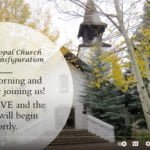Doctor James Allen Francis (1864-1928) penned perhaps the greatest summation of Jesus’ life in several hundred years. Allen was born one hundred years before me in Nova Scotia, called to the pastorate at 21 years old (I like him already!). He served New York’s famous Riverside Baptist Church and other Eastern pulpits before heading to Los Angeles, California. He died the year our denomination approved the penitential, post-World War I 1928 Book of Common Prayer, the Episcopal Church’s dazed, post-traumatic response to the cataclysmic Great War. And while Episcopalians were corporately re-discovering the liturgical language of contrition (“We forgot about sin” one commentator lamented, commenting upon the naively optimistic tone of the 19th century’s 1892 Book of Common Prayer ), on July 11th, 1926, one modest Protestant preached a Christological masterwork during a Baptist youth gathering in LA. Now popularly titled by Allen’s last line, I have always treasured his presentation of our Lord. Here it is:
Here is a man who was born in an obscure village as the child of a peasant woman.
He grew up in another obscure village. He worked in a carpenter shop until he was thirty and then for three years was an itinerant preacher. He never wrote a book. He never held an office. He never owned a home. He never had a family. He never went to college. He never put his foot inside a big city. He never traveled two hundred miles from the place where he was born. He never did one of the things that usually accompany greatness. He had no credentials but himself. He had nothing to do with this world except the naked power of his divine manhood. While still a young man the tide of popular opinion turned against him. His friends ran away. One of them denied him. Another betrayed him. He was turned over to his enemies. He went through the mockery of a trial. He was nailed upon the cross between two thieves. His executioners gambled for the only piece of property he had on earth while he was dying, and that was his coat. When he was dead, he was taken down and laid in a borrowed grave through the pity of a friend.
Nineteen wide centuries have come and gone and today he is the center of the human race and the leader of the column of progress. I am far within the mark when I say that all the armies that ever marched, and all the navies that were ever built, and all the parliaments that ever sat and all the kings that ever reigned, put together, have not affected the life of man upon the earth as powerfully as has this one solitary life.
Epiphany is about God’s manifestation, God’s revelation of Himself (Godself is theologically more precise but so dang grammatically awkward) to us in observable, palpable and intimate fashion. Two days ago I asked us to reflect together upon being the apple of God’s divine eye, the recipient of God’s unfathomable attention. Today, I ask us to ponder in good Marian style the person and work of our Lord. Even as Trinitarian Christians, which we are, we must encounter Jesus personally. Many 19th Episcopalian pulpits had this gospel phrase carved into the exterior rear-facing wood or stone frame, What Think Ye of Christ, to remind the preacher that encountering Jesus in Word and Sacrament is the beating heart of Anglican worship. To paraphrase another contemporary theological meme, Jesus really is God in street clothes! No ordinal assignments today, but a plea instead. Read a gospel, conduct a study, pray a prayer, contemplate in your prayer space, open the Book of Common Prayer, take a hike or ski or walk….and seek Jesus. His (yes this is historically accurate dear readers!) face, his hands, his eyes, his feet, his immensely strong arms as a carpenter. For our Catholic-minded readers, His divine heart. For our more Protestant folks, Jesus’ sacrificial death upon the cross. Infant, child, young adult, resurrected….take your pick. One solitary life for the life of the world.

